Unit 3 Could you please clean your room? Section B Period 2 课件58张
文档属性
| 名称 | Unit 3 Could you please clean your room? Section B Period 2 课件58张 | 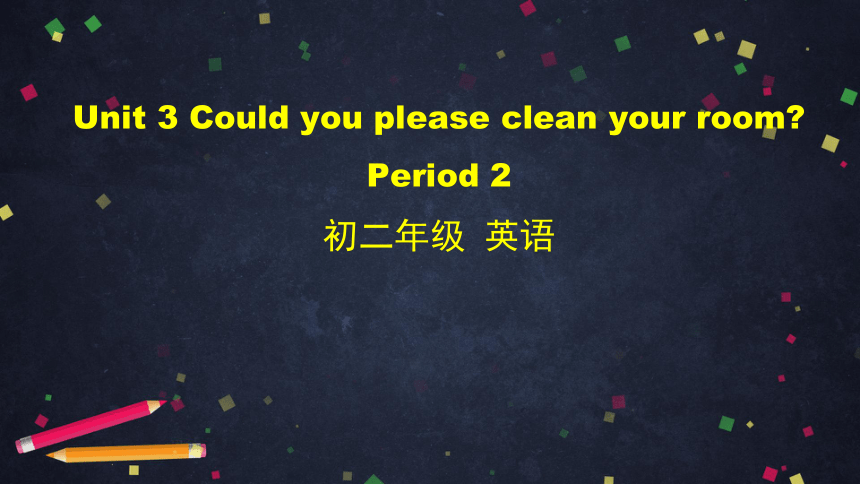 | |
| 格式 | pptx | ||
| 文件大小 | 3.5MB | ||
| 资源类型 | 试卷 | ||
| 版本资源 | 人教新目标(Go for it)版 | ||
| 科目 | 英语 | ||
| 更新时间 | 2021-02-26 09:12:56 | ||
图片预览

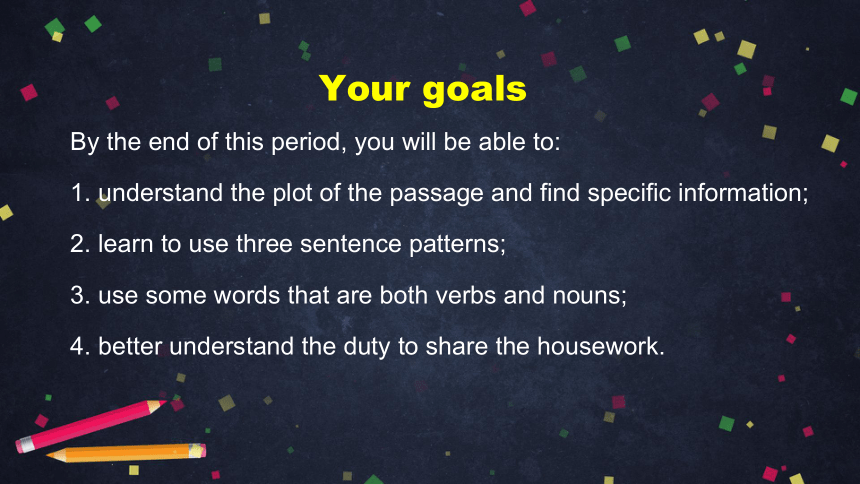
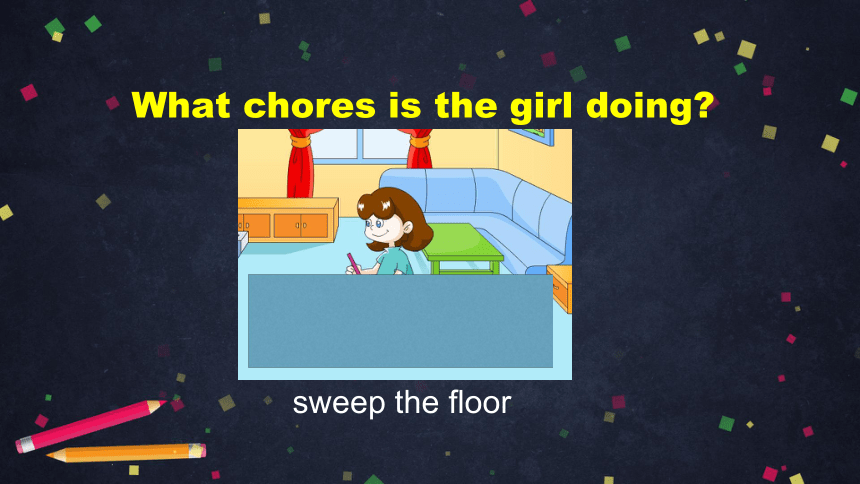
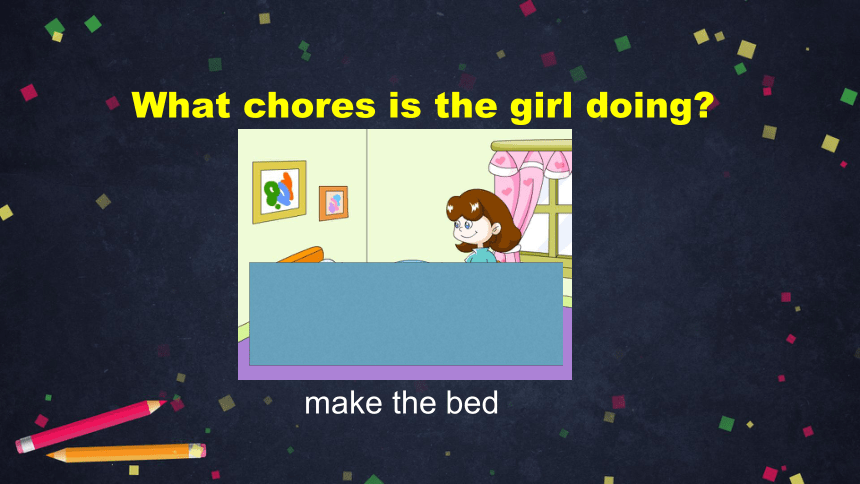
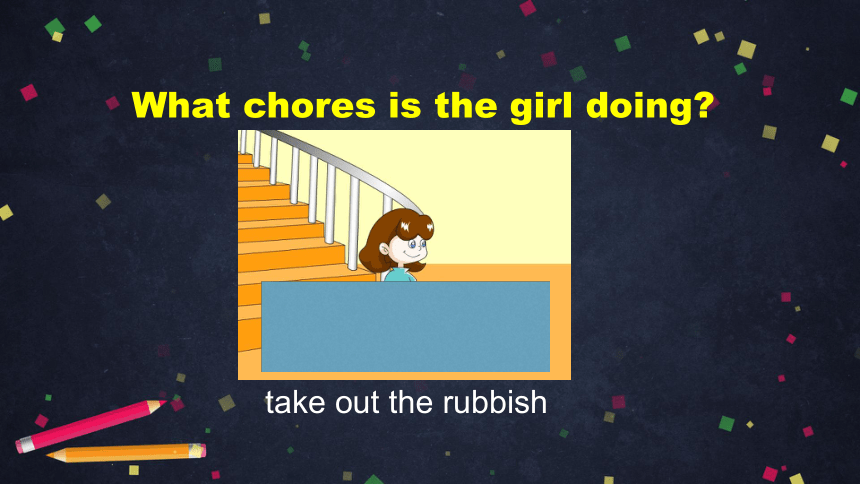
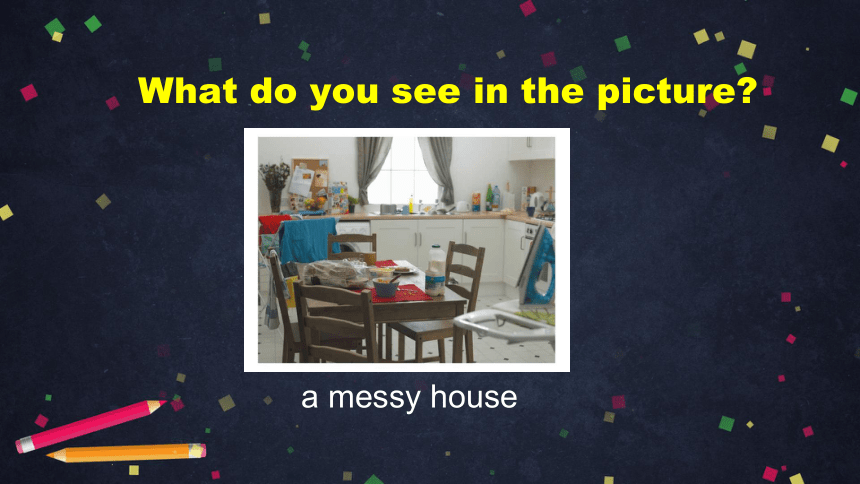
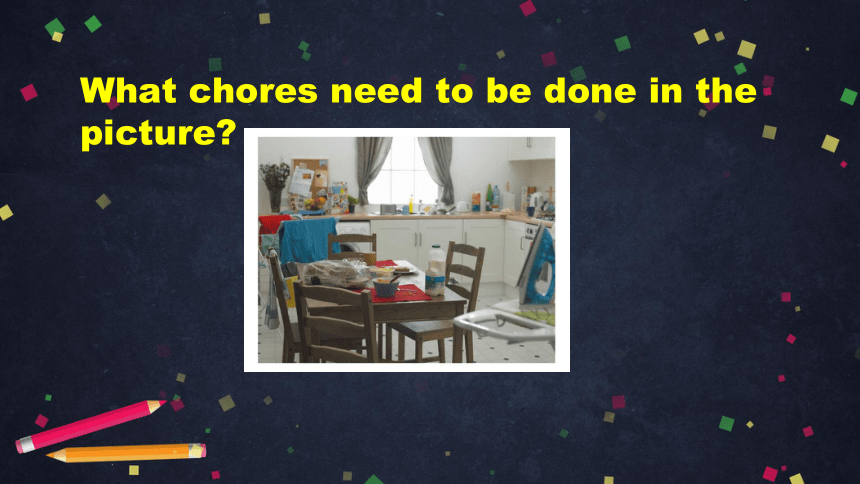
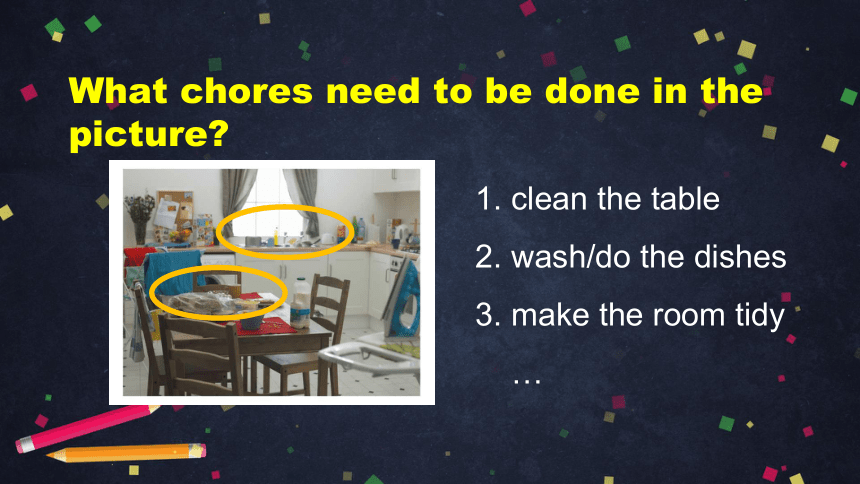
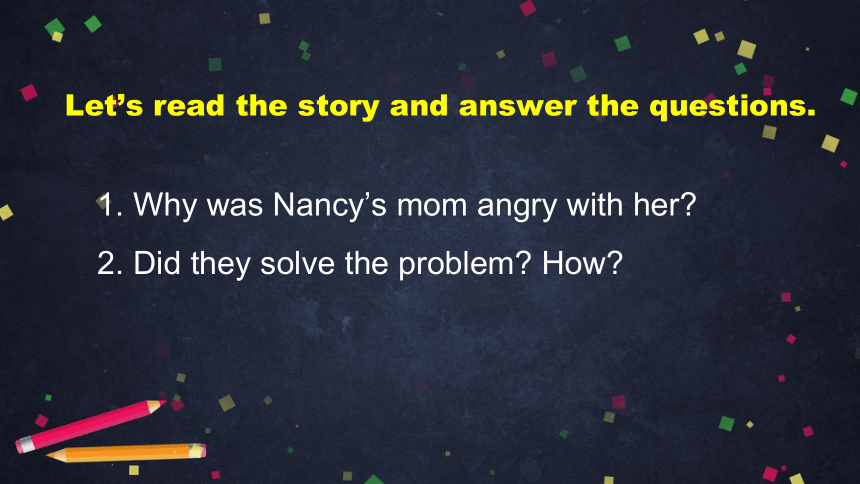
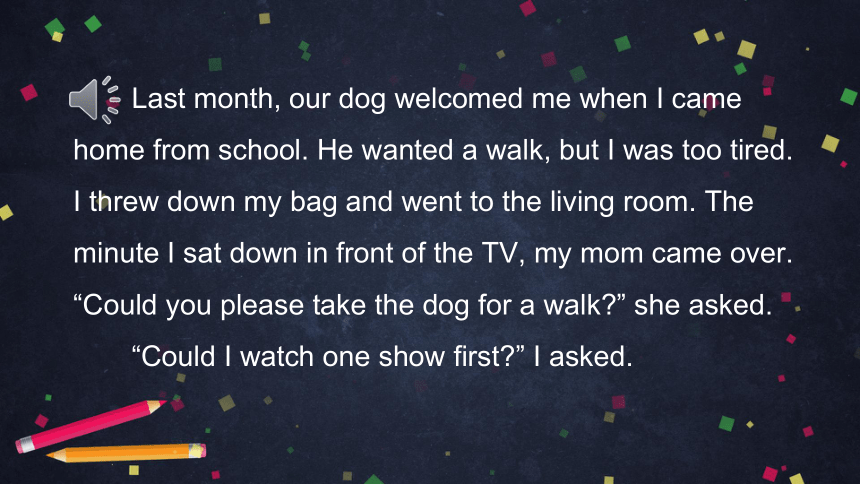
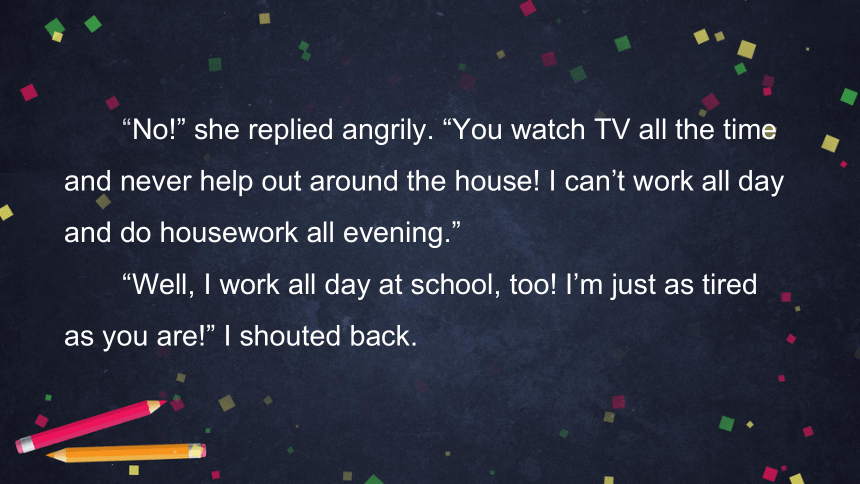
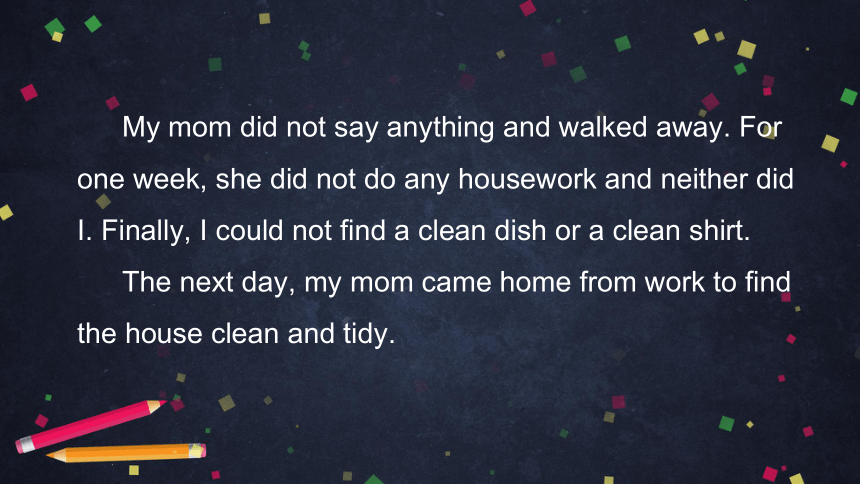
文档简介
Unit 3 Could you please clean your room? Period 2
初二年级 英语
Your goals
By the end of this period, you will be able to:
1. understand the plot of the passage and find specific information;
2. learn to use three sentence patterns;
3. use some words that are both verbs and nouns;
4. better understand the duty to share the housework.
sweep the floor
What chores is the girl doing?
make the bed
What chores is the girl doing?
take out the rubbish
What chores is the girl doing?
What do you see in the picture?
a messy house
What chores need to be done in the picture?
1. clean the table
2. wash/do the dishes
3. make the room tidy
…
What chores need to be done in the picture?
Let’s read the story and answer the questions.
1. Why was Nancy’s mom angry with her?
2. Did they solve the problem? How?
Last month, our dog welcomed me when I came home from school. He wanted a walk, but I was too tired. I threw down my bag and went to the living room. The minute I sat down in front of the TV, my mom came over. “Could you please take the dog for a walk?” she asked.
“Could I watch one show first?” I asked.
“No!” she replied angrily. “You watch TV all the time and never help out around the house! I can’t work all day and do housework all evening.”
“Well, I work all day at school, too! I’m just as tired as you are!” I shouted back.
My mom did not say anything and walked away. For one week, she did not do any housework and neither did I. Finally, I could not find a clean dish or a clean shirt.
The next day, my mom came home from work to find the house clean and tidy.
“What happened?” she asked in surprise.
“I’m so sorry, Mom. I finally understand that we need to share the housework to have a clean and comfortable home,” I replied.
1. Why was Nancy’s mom angry with her?
Because Nancy’s mom wanted her to take the dog out for a walk but she refused to do it then. Besides, her mom thought she watched TV all the time instead of helping out around the house.
2. Did they solve the problem? How?
Yes. Both Nancy and her mother did not do any housework for a week. The house got so messy that Nancy could not even find a clean dish or a clean shirt. She decided to do the housework to make the house clean and tidy again. She also apologized to her mom and told her that she understood that they should share the housework.
Plot diagram for a story
—the witch’s hat diagram
exposition
rising action
climax
falling action
resolution
见任务单
(the most important or exciting part)
(conflict)
(background)
(events after the climax)
(ending)
Last month, our dog welcomed me when I came home from school. He wanted a walk, but I was too tired. I threw down my bag and went to the living room. The minute I sat down in front of the TV, my mom came over.
the reason of the conflict
main characters
My dog wanted a walk but I was too tired.
Exposition
“Could you please take the dog for a walk?” she asked.
“Could I watch one show first?” I asked.
“Could you please take the dog for a walk?” she asked.
Mom is making a request.
“Could I watch one show first?” I asked.
Nancy is asking for permission.
“Could you please take the dog for a walk?” she asked.
“Could I watch one show first?” I asked.
Rising action
Nancy’s mom asked her to walk the dog, but she refused.
“No!” she replied angrily. “You watch TV all the time and never help out around the house! I can’t work all day and do housework all evening.”
“Well, I work all day at school, too! I’m just as tired
as you are!” I shouted back.
“No!” she replied angrily.
“Well, I work all day at school, too! I’m just as tired as you are!” I shouted back.
Climax
Nancy and her mom had a quarrel.
My mom did not say anything and walked away. For one week, she did not do any housework and neither did I. Finally, I could not find a clean dish or a clean shirt.
My mom did not say anything and walked away. For one week, she did not do any housework and neither did I. Finally, I could not find a clean dish or a clean shirt.
Falling action
Both Nancy and her mom didn’t do any housework for a week.
The next day, my mom came home from work to find the house clean and tidy.
“What happened?” she asked in surprise.
“I’m so sorry, Mom. I finally understand that we need to share the housework to have a clean and comfortable home,” I replied.
The next day, my mom came home from work to find the house clean and tidy.
“What happened?” she asked in surprise.
“I’m so sorry, Mom. I finally understand that we need to share the housework to have a clean and comfortable home,” I replied.
Resolution
Nancy understood her mom and did the housework to make their room tidy and clean.
The dog wanted a walk but Nancy was too tired.
Exposition
Rising action
Nancy’s mom asked her to walk the dog, but she refused.
Climax
Nancy and her mom had a quarrel.
Falling action
Both Nancy and her mom didn’t do any housework for a week.
Resolution
Nancy understood her mom and did the housework to make their room tidy and clean.
Discussion
见任务单
What caused the change in Nancy’s attitude?
Empathy
Care
Consideration
3b. Can you find the sentences from the reading with the same meaning as the sentences below?
1. Neither of us did any housework for a week.
2. My mom came over as soon as I sat down in front of
the TV.
3. You are tired, but I am tired, too.
1. Neither of us did any housework for a week.
For one week, she did not do any housework and neither did I.
在表达一个人没有做某事,另一个人也没做同一类事时,可用neither或nor进行简略回答,其结构为:Neither/Nor+助动词/情态动词/be动词+主语。例如:
1. He doesn’t go to school by bike. Neither/Nor do I.
2. They didn’t go to the park yesterday. Neither/Nor did we.
3. I haven’t finished the homework. Neither/Nor has she.
4. I couldn’t get out of the house then. Neither/Nor
could he.
在表达一个人没有做某事,另一个人也没做同一类事时,可用neither或nor进行简略回答,其结构为:Neither/Nor+助动词/情态动词/be动词+主语。例如:
1. He doesn’t go to school by bike. Neither/Nor do I.
2. They didn’t go to the park yesterday. Neither/Nor did we.
3. I haven’t finished the homework. Neither/Nor has she.
4. I couldn’t get out of the house then. Neither/Nor
could he.
I don’t like swimming. Neither/Nor does he.
He is not good at swimming. Neither am I.
I don’t like swimming. Neither/Nor does he.
He is not good at swimming. Neither am I.
I don’t like swimming. Neither/Nor does he.
He is not good at swimming. Neither am I.
Practice
— I?don’t?like?this?dress.?
我不喜欢这件连衣裙。
—?
我也不喜欢。
Neither/Nor?do?I.
见任务单
翻译:我的父母都不是医生。
Neither of my parents is a doctor.
同义句:
My father is not a doctor. Neither/Nor is my mother.
Neither my father nor my mother is a doctor.
Neither of us did any housework for a week.
见任务单
neither…nor…
neither在“neither…nor…”这个句型中作连词,整个句型意思是“既不…也不…”,用来连接两个并列成分。连接两个并列主语时,谓语动词的形式由nor后面的名词来决定。
见任务单
例如:Tom和我都不学画画。
Neither Tom nor I am learning to draw.
同义句:
Neither of Tom and me is learning to draw.
I am not learning to draw. Neither is Tom.
见任务单
2. My mom came over as soon as I sat down in front of the TV.
The minute I sat down in front of the TV, my mom came over.
the minute=the moment=as soon as
他一开口,我就听出了他的声音。
The minute he spoke, I recognized his voice.
As soon as he spoke, I recognized his voice.
一旦做了这个决定,你就会丧失这次良好的机会。
As soon as/The moment you make the decision, you will lose the great chance.
3. You’re tired, but I’m tired, too.
I’m just as tired as you are!
as + adj./adv. + as…
这部电影和那部电影一样有趣。
This film is?as?interesting?as?that?one.
同义句:
This film is interesting, and that one is interesting, too.
他打篮球打得和姚明一样好。
He plays basketball as well as Yao Ming.
Yao Ming plays basketball well and he plays
well, too.
Practice
My mom always buys some interesting books for me as my birthday gift.
This house is a good buy.
My mom always buys some interesting books for me as my birthday gift.
My mom has booked a plane ticket from Beijing to Yunnan.
3c. Nouns or verbs?
1. Could you take the dog for a walk?
2. Could I watch one show first?
3. I can’t work all day.
noun
noun
verb
—Make a sentence with the other form.
I walked home from school.
He showed us how to make ice-cream.
I’ve got some work to do.
verb
verb
noun
4. You watch TV all the time.
5. “What happened?” she asked in surprise.
The police kept a close watch on that house for two weeks.
verb
noun
verb
Can you find more words of this kind from out text?
noun
His progress in English surprised me.
3c. Nouns or verbs?
—Make a sentence with the other form.
Last month, our dog welcomed me when I came home from school.
Eg:我热烈欢迎这个决定。
I warmly welcome the decision.
获胜者凯旋而归时受到了热烈欢迎。
The winners were given a warm welcome when they arrived home.
verb
noun
verb
Let’s read some more sentences
1. Don’t your child.
2. After dinner, please trays to Dishroom.
3. through any dictionary, and you will see pages of words followed by definition.
baby
bus
Thumb
Homework
1.复述3a文章。
2.积累本单元既是名词又是动词的词汇。
3.用今天所学的三个句式造句。
(见任务单)
Thanks for watching!
初二年级 英语
Your goals
By the end of this period, you will be able to:
1. understand the plot of the passage and find specific information;
2. learn to use three sentence patterns;
3. use some words that are both verbs and nouns;
4. better understand the duty to share the housework.
sweep the floor
What chores is the girl doing?
make the bed
What chores is the girl doing?
take out the rubbish
What chores is the girl doing?
What do you see in the picture?
a messy house
What chores need to be done in the picture?
1. clean the table
2. wash/do the dishes
3. make the room tidy
…
What chores need to be done in the picture?
Let’s read the story and answer the questions.
1. Why was Nancy’s mom angry with her?
2. Did they solve the problem? How?
Last month, our dog welcomed me when I came home from school. He wanted a walk, but I was too tired. I threw down my bag and went to the living room. The minute I sat down in front of the TV, my mom came over. “Could you please take the dog for a walk?” she asked.
“Could I watch one show first?” I asked.
“No!” she replied angrily. “You watch TV all the time and never help out around the house! I can’t work all day and do housework all evening.”
“Well, I work all day at school, too! I’m just as tired as you are!” I shouted back.
My mom did not say anything and walked away. For one week, she did not do any housework and neither did I. Finally, I could not find a clean dish or a clean shirt.
The next day, my mom came home from work to find the house clean and tidy.
“What happened?” she asked in surprise.
“I’m so sorry, Mom. I finally understand that we need to share the housework to have a clean and comfortable home,” I replied.
1. Why was Nancy’s mom angry with her?
Because Nancy’s mom wanted her to take the dog out for a walk but she refused to do it then. Besides, her mom thought she watched TV all the time instead of helping out around the house.
2. Did they solve the problem? How?
Yes. Both Nancy and her mother did not do any housework for a week. The house got so messy that Nancy could not even find a clean dish or a clean shirt. She decided to do the housework to make the house clean and tidy again. She also apologized to her mom and told her that she understood that they should share the housework.
Plot diagram for a story
—the witch’s hat diagram
exposition
rising action
climax
falling action
resolution
见任务单
(the most important or exciting part)
(conflict)
(background)
(events after the climax)
(ending)
Last month, our dog welcomed me when I came home from school. He wanted a walk, but I was too tired. I threw down my bag and went to the living room. The minute I sat down in front of the TV, my mom came over.
the reason of the conflict
main characters
My dog wanted a walk but I was too tired.
Exposition
“Could you please take the dog for a walk?” she asked.
“Could I watch one show first?” I asked.
“Could you please take the dog for a walk?” she asked.
Mom is making a request.
“Could I watch one show first?” I asked.
Nancy is asking for permission.
“Could you please take the dog for a walk?” she asked.
“Could I watch one show first?” I asked.
Rising action
Nancy’s mom asked her to walk the dog, but she refused.
“No!” she replied angrily. “You watch TV all the time and never help out around the house! I can’t work all day and do housework all evening.”
“Well, I work all day at school, too! I’m just as tired
as you are!” I shouted back.
“No!” she replied angrily.
“Well, I work all day at school, too! I’m just as tired as you are!” I shouted back.
Climax
Nancy and her mom had a quarrel.
My mom did not say anything and walked away. For one week, she did not do any housework and neither did I. Finally, I could not find a clean dish or a clean shirt.
My mom did not say anything and walked away. For one week, she did not do any housework and neither did I. Finally, I could not find a clean dish or a clean shirt.
Falling action
Both Nancy and her mom didn’t do any housework for a week.
The next day, my mom came home from work to find the house clean and tidy.
“What happened?” she asked in surprise.
“I’m so sorry, Mom. I finally understand that we need to share the housework to have a clean and comfortable home,” I replied.
The next day, my mom came home from work to find the house clean and tidy.
“What happened?” she asked in surprise.
“I’m so sorry, Mom. I finally understand that we need to share the housework to have a clean and comfortable home,” I replied.
Resolution
Nancy understood her mom and did the housework to make their room tidy and clean.
The dog wanted a walk but Nancy was too tired.
Exposition
Rising action
Nancy’s mom asked her to walk the dog, but she refused.
Climax
Nancy and her mom had a quarrel.
Falling action
Both Nancy and her mom didn’t do any housework for a week.
Resolution
Nancy understood her mom and did the housework to make their room tidy and clean.
Discussion
见任务单
What caused the change in Nancy’s attitude?
Empathy
Care
Consideration
3b. Can you find the sentences from the reading with the same meaning as the sentences below?
1. Neither of us did any housework for a week.
2. My mom came over as soon as I sat down in front of
the TV.
3. You are tired, but I am tired, too.
1. Neither of us did any housework for a week.
For one week, she did not do any housework and neither did I.
在表达一个人没有做某事,另一个人也没做同一类事时,可用neither或nor进行简略回答,其结构为:Neither/Nor+助动词/情态动词/be动词+主语。例如:
1. He doesn’t go to school by bike. Neither/Nor do I.
2. They didn’t go to the park yesterday. Neither/Nor did we.
3. I haven’t finished the homework. Neither/Nor has she.
4. I couldn’t get out of the house then. Neither/Nor
could he.
在表达一个人没有做某事,另一个人也没做同一类事时,可用neither或nor进行简略回答,其结构为:Neither/Nor+助动词/情态动词/be动词+主语。例如:
1. He doesn’t go to school by bike. Neither/Nor do I.
2. They didn’t go to the park yesterday. Neither/Nor did we.
3. I haven’t finished the homework. Neither/Nor has she.
4. I couldn’t get out of the house then. Neither/Nor
could he.
I don’t like swimming. Neither/Nor does he.
He is not good at swimming. Neither am I.
I don’t like swimming. Neither/Nor does he.
He is not good at swimming. Neither am I.
I don’t like swimming. Neither/Nor does he.
He is not good at swimming. Neither am I.
Practice
— I?don’t?like?this?dress.?
我不喜欢这件连衣裙。
—?
我也不喜欢。
Neither/Nor?do?I.
见任务单
翻译:我的父母都不是医生。
Neither of my parents is a doctor.
同义句:
My father is not a doctor. Neither/Nor is my mother.
Neither my father nor my mother is a doctor.
Neither of us did any housework for a week.
见任务单
neither…nor…
neither在“neither…nor…”这个句型中作连词,整个句型意思是“既不…也不…”,用来连接两个并列成分。连接两个并列主语时,谓语动词的形式由nor后面的名词来决定。
见任务单
例如:Tom和我都不学画画。
Neither Tom nor I am learning to draw.
同义句:
Neither of Tom and me is learning to draw.
I am not learning to draw. Neither is Tom.
见任务单
2. My mom came over as soon as I sat down in front of the TV.
The minute I sat down in front of the TV, my mom came over.
the minute=the moment=as soon as
他一开口,我就听出了他的声音。
The minute he spoke, I recognized his voice.
As soon as he spoke, I recognized his voice.
一旦做了这个决定,你就会丧失这次良好的机会。
As soon as/The moment you make the decision, you will lose the great chance.
3. You’re tired, but I’m tired, too.
I’m just as tired as you are!
as + adj./adv. + as…
这部电影和那部电影一样有趣。
This film is?as?interesting?as?that?one.
同义句:
This film is interesting, and that one is interesting, too.
他打篮球打得和姚明一样好。
He plays basketball as well as Yao Ming.
Yao Ming plays basketball well and he plays
well, too.
Practice
My mom always buys some interesting books for me as my birthday gift.
This house is a good buy.
My mom always buys some interesting books for me as my birthday gift.
My mom has booked a plane ticket from Beijing to Yunnan.
3c. Nouns or verbs?
1. Could you take the dog for a walk?
2. Could I watch one show first?
3. I can’t work all day.
noun
noun
verb
—Make a sentence with the other form.
I walked home from school.
He showed us how to make ice-cream.
I’ve got some work to do.
verb
verb
noun
4. You watch TV all the time.
5. “What happened?” she asked in surprise.
The police kept a close watch on that house for two weeks.
verb
noun
verb
Can you find more words of this kind from out text?
noun
His progress in English surprised me.
3c. Nouns or verbs?
—Make a sentence with the other form.
Last month, our dog welcomed me when I came home from school.
Eg:我热烈欢迎这个决定。
I warmly welcome the decision.
获胜者凯旋而归时受到了热烈欢迎。
The winners were given a warm welcome when they arrived home.
verb
noun
verb
Let’s read some more sentences
1. Don’t your child.
2. After dinner, please trays to Dishroom.
3. through any dictionary, and you will see pages of words followed by definition.
baby
bus
Thumb
Homework
1.复述3a文章。
2.积累本单元既是名词又是动词的词汇。
3.用今天所学的三个句式造句。
(见任务单)
Thanks for watching!
同课章节目录
- Unit 1 What's the matter?
- Section A
- Section B
- Unit 2 I'll help to clean up the city parks.
- Section A
- Section B
- Unit 3 Could you please clean your room?
- Section A
- Section B
- Unit 4 Why don't you talk to your parents?
- Section A
- Section B
- Unit 5 What were you doing when the rainstorm came
- Section A
- Section B
- Review of Units 1-5
- Unit 6 An old man tried to move the mountains.
- Section A
- Section B
- Unit 7 What's the highest mountain in the world?
- Section A
- Section B
- Unit 8 Have you read Treasure Island yet?
- Section A
- Section B
- Unit 9 Have you ever been to a museum?
- Section A
- Section B
- Unit 10 I've had this bike for three years.
- Section A
- Section B
